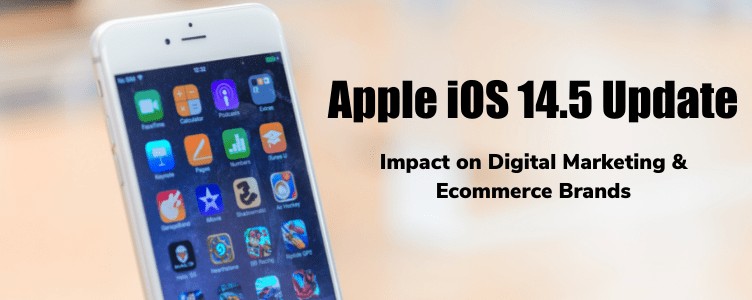Big News For Digital Marketing
Apple has now shared the release date of the iOS 14.5 update, along with updates to iPadOS, macOS, & WatchOS. Privacy is at the root of the update which Apple has vowed it will now play a much more transparent role with how data and data collection efforts will play out. Here is a summarization of iOS 14.5 Marketing of what potentially could happen and what the corresponding impact will be on digital marketing and eCommerce.
Google programs that touch Apple devices will be affected across all channels, including Search, Display, and Video. Unlike many social apps, much of the advertising on Google, especially on Search. All are closer to the end of the marketing funnel also the end of the shopping journey. As a result, search campaigns will have the most insignificant impact.
The Impact
IDFA (the device identifier to track data) is used with browser cookies to deliver relevant and personalized ad experiences to an audience, which leads to higher ad conversions for advertisers. Apple’s iOS update will give users the option to disable app tracking on a frequent level. Therefore, advertising companies won’t be able to track user behavior as readily as they did before.
This move will force advertisers to make changes on their platforms to comply with the latest Apple guidelines or face rejection of their ads. For the record – 70% of iOS users share IDFA data with advertisers. That number is expected to decrease to 15% or 10% in the coming months.
So why did this happen?
Apple’s CEO, Tim Cook, shared his perspective recently and with honest candor, offered that his Silicon Valley rivals were doing everything they could to learn as much as possible about consumers while concurrently monetizing every nuance and mouse click that we make. The irony of course is that everyone knows this has been happening at least most of us.
The majority of Americans — about six out of ten — now believe that they’re being monitored by a company or even potentially the government. Most, a full 81 percent, also believe that they don’t have much power over this kind of tracking.
In an article by Gear Brain (January 2020), they shared that The Pew Research Center surveyed a small group, 1,148 people who live in the U.S. in December 2019, finding that while 74 percent “are concerned or very concerned” about online privacy, 63 percent don’t know what to do about protecting their information. Consequently, at the heart of the matter is what is being tracked, how and what is being done with data.
In Tim Cook’s bold move, he has effectively drawn a line in the sand and challenged others to play ball with their data captures via online portals to track us as consumers. The activity has been around for a long while and will not stop of course but consumers will now know definitively via more frequent reminders that their actions are delivering treasure troves of data about consumption and navigation habits around the World Wide Web.
This move will force advertisers to make changes on their platforms to comply with these Apple guidelines or fear rejection of their Ads.
What is changing is that in order to access information consumers will be prompted more often to relinquish control over their data. The major impact of the update is how platforms such as Facebook, Instagram, etc will handle user privacy and data utilization and of course how it will impact opt-out actions so critical to digital marketing success.
Facebook (and other channels) will likely develop its own data modeling tool that will be available to advertisers within Ads Manager once Facebook gathers all the data it needs to establish the “new normal.”
Our Take-Away
Yes, changes are big and will certainly impact how advertisers will see results in performance. To what extent, no one really knows. It will be a while before this action truly reveals to what degree opting in will change for online campaigns. At Media Components, we’ve worked diligently to diversify channel strategies knowing we’re heading into a new era where cookies and tracking will be far less prevalent.
It’s important not to pivot on strategies too quickly as performance metrics begin fluctuating. The equalizer here is that any advertiser who has been a diligent, aggressive, and consistent use of digital media will recognize quickly that they will not be alone with their performance fluctuations. In other words, it will be no bargain seeing different results from the same dollars, but privacy tweaks like this will also serve to be an equalizer for all brand’s activities.
Our recommendation is to remain strategically prudent on watching and not overreacting until we see the longer-term implications. Any knee-jerk reactions may also cause further fluctuations in and of itself as its systems and processes begin occurring in the marketplace.
Denis Sinelnikov
President
Media Components






